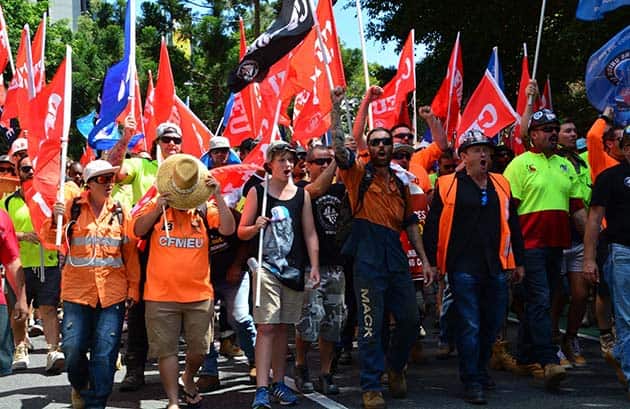It’s becoming clearer by the day that workers’ fundamental right to strike is under attack.
The ban on the NSW train strike by the Fair Work Commission revealed that the Fair Work Act is loaded in favour of the bosses.
Our system of enterprise bargaining makes any strike action outside defined “bargaining periods” when an agreement expires, illegal. And even in a bargaining period, unions have to go through complicated procedures of balloting and giving notice before industrial action is approved.
On top of that, striking in solidarity with other workplaces is banned, as is going on strike for political reasons as the Builders Labourers’ did with the Green Bans.
ACTU leader Sally McManus’ speech at the National Press Club on 21 March was billed as the “most important speech by a union leader in a generation”.
She rightly denounced casualisation, stagnating wages and rampant inequality. She also spelled out problems with enterprise bargaining and called for the right to bargain across a whole sector or industry.
However, there was virtually nothing about industrial action and winning the right to strike.
The unrestricted right to strike has to be at the centre of union campaigning, but we won’t get this from the ACTU. That’s because the ACTU’s strategy is to change the government to “change the rules”. Its goal is electing a Labor government, which means it will focus on campaigning for changes Labor is prepared to make.
Labor is suggesting some modest changes to the law around termination of agreements and restricting labour hire.
But it is not talking about removing constraints on striking. Those constraints were put in place by Labor under Paul Keating, when they introduced enterprise bargaining. John Howard’s Workplace Relations Act ramped up the restrictions and then came WorkChoices. Kevin Rudd was elected with a mandate to scrap WorkChoices but his government retained most of the constraints on striking.
It’s clear that the push for the right to strike to be at the centre of the ACTU’s “Change the Rules” campaign will have to come from rank-and-file union members and union branches.
We have no time to lose. We can’t wait for a Labor government that would probably break its promises anyway.
Aggressive tactics
Bosses are using aggressive tactics of threatening to rip up expired agreements and force workers onto the lower award pay and conditions. This is intimidating unions into accepting cuts to wages and conditions.
Murdoch University and Griffin Coal terminated their agreements. Griffin Coal workers copped a 43 per cent pay cut and loss of entitlements and conditions when their agreement was terminated and they fell back onto the award.
Workers had to survive on award wages for 12 months, and eventually accepted a big pay cut in the new agreement they signed.
The bosses are following the same tactic at the Port Kembla coal terminal. Qube Ports has also applied to terminate its agreement with the MUA in Melbourne. MUA officials said that dockers would not return to work if the agreement is terminated. That’s the type of response we need.
At Glencore’s Oaky North coal mine Fair Work ordered an end to industrial action and a second vote on a proposed agreement on 27 March. Workers already rejected this shoddy offer back in January.
Despite this, the CFMEU leadership is telling members to vote yes or face termination of the agreement. The CFMEU could have won this dispute hands down if it had spread the dispute and shut down even a few of Glencore’s other coal mines in Queensland and NSW.
This is just one example where breaking the law to go on strike could have clinched victory. But union leaders are increasingly hesitant to organise strikes outside the law.
And the noose is tightening around unions that do call illegal strikes. The MUA and CFMEU face millions of dollars of fines for organising an illegal picket at Melbourne’s Webb Dock. The only way to stand up to this is to start refusing to pay the fines.
Victorian Trades Hall has called a delegates meeting for 17 April and a weekday rally on 9 May as part of “Change the Rules”. This could be the start of the campaign we need—a mass industrial campaign willing to defy the law and win the right to strike.
But it is going to take an organised push from rank-and-file workers and union branches to put the unrestricted right to strike at the centre of the campaign.
And we have to be willing to walk people off the job to fight for it.
Right to Strike Public Meeting in Sydney: Saturday April 14, 3pm at MUA Office, 365 Sussex St.
By Miro Sandev






